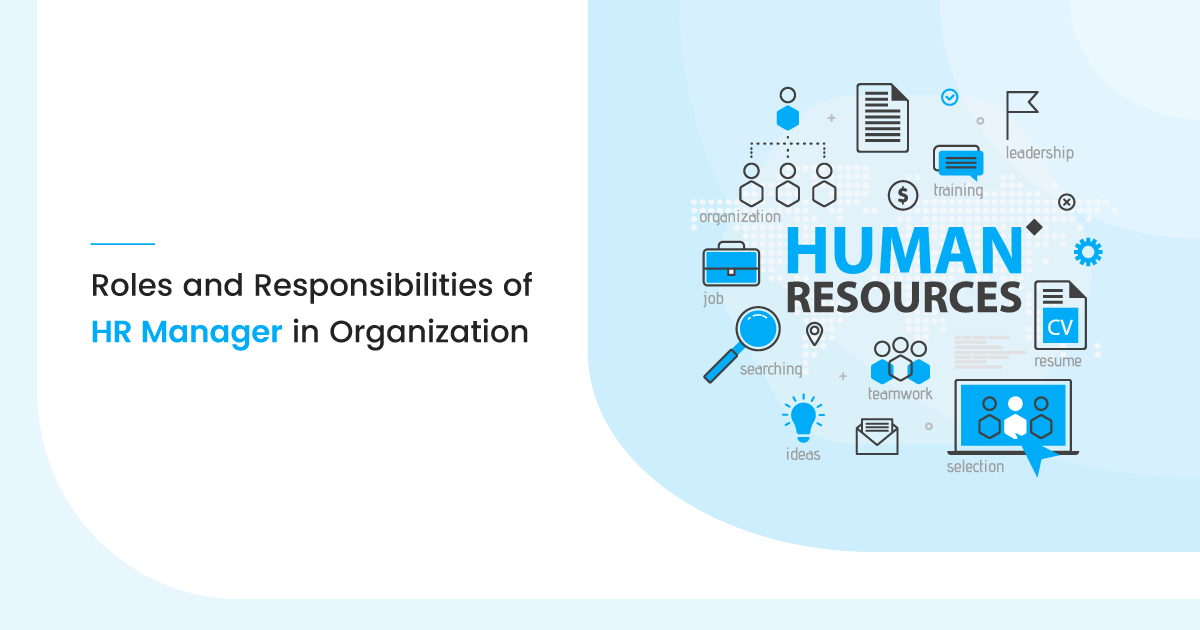A company thrives because of its employees. Various departments across the organization, such as the development team, customer support, marketing, and sales, just to name a few, makes it possible for you to run the business successfully.
At the same time, the roles and responsibilities of HR managers cannot be ignored. They help manage various departments across the organization, improve their productivity, and retain employees. However, given the evolving landscape of the working environment, legal obligations, and strategic management of businesses, the roles and responsibilities of HR managers are widening.
Top 10 Key Roles and Responsibilities of HR Manager
1. Human Resource Planning
HR managers are responsible for planning and achieving organizational objectives. They usually engage in identifying, preparing, and executing business goals with top-level executives.
This proactive participation in planning enables HR managers to gain a thorough understanding of the activities required to support the sustainable growth of the company. This, in turn, empowers HRs to assign the right resources to the right project and ensures timely delivery.
The roles of HR managers include analyzing and acknowledging team leaders (TL) about their expected vs. actual results. They also help TLs better understand their target and create strategies to achieve them.
2. Job Analysis and Design
As mentioned above, human resource planning requires assigning the right resources to the right project. And if the right person is not in the organization, HR managers are responsible for designing the job analysis to hire them.
A job analysis includes:
- Job description
- Employee’s position in the organization
- Who the employee should report to
- Resources the employee will need to perform the job efficiently
- Individual data related to the post, such as technical skills, work experience, etc.
- Work schedule
- Salary and incentives
- Personal attributes, such as personality, values, and interests
In addition to this, The responsibilities of the HR manager includes:
- Job rotation: Transferring employees from one task to another depending on the requirement and their skills
- Job enlargement: Merging previously distributed (similar) tasks into one job
- Job enrichment: Adding more responsibility to an employee’s job
- Creating high-performance working groups: Building teams to complete tasks that require high levels of performance

Looking for HR Software? Check out SoftwareSuggest’s list of the best HR software solutions.
3.Hiring Candidates
Finding and hiring the right talent is a very complex process. Modern HR managers do more than just posting job requirements in portals to fill open positions. They develop strategic solutions to attract the right candidates to fulfill the demands of the business.
From screening potential candidates on job portals and social platforms like LinkedIn to interviewing them, HR managers have to follow an organized approach for hiring the best suitable employee for the organization.
Once an applicant is selected, HR managers design offer letters and onboarding procedures. In case, a candidate backs out at the last moment, HR managers are bound to convince them to join the organization. If they still insist not to, HR managers need to repeat the hiring process to fill open positions.
4. Training and Development
Hiring the best candidates is just half the job. HR managers need to train and upskill them to maximize their return on investment.
The type of training and development new employees require depends on their experience. For example, if they are freshers, managers might need to arrange for skill-development training programs to ensure their work meets the industry standards.
However, if the recruits already have a few years of experience, managers might only need to train them about company policies.
HR managers are also answerable for the quality of training. If most of the recruits are unable to pass the assessments, it indicates that either the trainer or the training program is not compliant to the industry standard, for which the HR manager will be held accountable.
5. Design Workplace Policies
It is essential for HR managers to design workplace policies to reduce conflicts, legal issues, and improve employee productivity. These policies are designed in a way that protects the interests of both the employees and employers alike.
Though workplace policies differ from organization to organization, the things it includes remain the same in every company, such as:
- Standard operating procedures
- Anti-harassment and non-discrimination
- Paid leaves, sick leaves, and time-off benefits
- Meal and break periods
- Time tracking
- Employee attendance and punctuality
HR managers also need to comply with federal, state, and local laws while designing workplace policies. Some laws require managers to communicate the workplace policies in writing. If you are an HR manager (or aspiring to be), make sure to stay on top of the local laws to avoid issues later.
6. Monitor Performance
Closely related to training, HR managers’ responsibilities include examining employee performance records to identify the scopes of improvement and arranging training workshops to upskill them.
93% of employees say professional growth is a priority. By providing employees with a chance to learn something new and grow professionally, you can create a positive environment and boost employee loyalty.
Besides, improving your employees’ skills brings additional benefits to the organization.
- First, they feel they are a vital part of the company
- Second, due to increased job satisfaction, they will give their best in each task
The way you help employees improve their performance depends on the available resources. For instance, if you have a high budget, you can arrange trainers to personally analyze and train them to achieve better results. If not, you can enroll them to attend conferences, webinars, online courses, etc.
7. Maintaining Work Culture
As an HR manager, it is your responsibility to shape and maintain organizational culture. It is essential to create a positive impression of the company from day one, so the new employees know what to expect.
Besides, a person’s performance depends largely on the environment he is working in. Therefore, you need to instill a certain level of comfort to eliminate any stressful atmosphere that might affect employees’ performance.
It is also vital to have an open-door policy so that employees can communicate their problems freely. This helps improve employee job satisfaction and retain talent.
Additionally, consider planning company events where employees can showcase their non-work-related talents like singing, dancing, mimicry, etc. It enhances the overall brand image and spreads positivity throughout the organization.
8. Resolve Conflict
In every organization, employees come from diverse backgrounds. And when people with opposite opinions meet, the chances of having a conflict rise significantly.
Whether the issue is between two employees or an employee and the management, it’s the HR manager who has to intervene and resolve it.
Besides, the HR manager must listen to both parties without being biased or judgemental. They also need to go to the root of the matter, which includes questioning other employees.
Depending on the type of conflict, HR managers also hold the right to fire an employee. However, this situation usually arises in cases of harassment in the office.
9. Ensure Health and Safety of Employee
Employees are the asset of the organization. Unless they are safe and healthy, they won’t be able to give their best to the company. Thus, HR managers need to ensure the health and safety of employees.
The way you plan for your employees’ health, and safety varies from company to company. For instance, for organizations that provide cab services to their staff, HR managers need to make sure that they are coming/reaching safely. It usually requires them to track the GPS of company cabs, call the employee/driver, keep a tab on the expected vs. actual arrival time.
Other roles of HR managers, in terms of health and safety of employees, include:
- Arranging an on-premise doctor for emergencies
- Arranging an on-premise ambulance
- Setting employee health benefits
- Setting up a sick room in the office for employees to rest, in case they are unwell
- Organizing fire safety training workshops
- Ensuring the food in the canteen (if you have) is hygienic
10. Rewards and Incentives
Lastly, HR managers need to reward employees based on their performance and other factors like punctuality. The biggest benefit of rewarding workers is that it creates a desire for other employees to excel at their job in the hope of getting incentives.
The type of rewards and incentives could be anything, such as holiday packages, a word of appreciation and recognition, promotions, or bonuses.
Additionally, you can consider giving the power to employees to choose the type of reward they want. Let them decide whether they want a bonus, flexible work times, leave, etc. It will make them feel valued, increase job satisfaction, and boost productivity.
Conclusion
HR managers are responsible for creating and managing a strong team. Whether it is human resource planning, job analysis, hiring the right talent, or resolving conflicts within the organization, it’s the HR manager who handles these tasks.
What do you think about the roles and responsibilities of HR managers in an organization? Did we miss anything? Let us know in the comments section!
Need Any Technology Assistance? Call Pursho @ 0731-6725516




